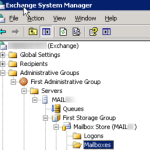Exchange 2003
IP-based AUTD failed to initialize, Error 0x80004005
Issue: You are experiencing timeout issues migrating email from Exchange 2003 using MigrationWiz
Circumstances: You observe the following event errors:
Event Type: Error
Event Source: Server ActiveSync
Event ID: 3015
Description: IP-based AUTD failed to initialize because the processing of notifications could not be setup. Error code [0x80004005]. Verify that no other applications are currently bound to UDP port [2883], or try specifying a different port number.
Event Type: Error
Event Read more [...]
Manually remove an Exchange 2003 server from AD and the Exchange Organization
Issue: There is a plethora of threads and confusing articles online about the topic of manually removing an Exchange 2003 server from your Exchange Org. This might be required when a server fails and is not restored from backup or when your graceful uninstall efforts through add/remove programs fail in the middle. If add/remove is simply giving you errors like mailboxes still exist or public folders still exist then I would take the time to properly decommission the server and continue with the Read more [...]
Exchange 2003 end of support
I recently had a call with Microsoft Product Support services on an Exchange case at a large enterprise customer and the bottom of their email was mention of:
This is coming up quickly, and I have to admit I was not following this date. As IT people we sometimes let certain products go out of support, I'd say the email system should not be one of them and it's definitely time to move forward to either Exchange 2010 or Office 365.
If you need assistance getting this project done quickly or Read more [...]
list Exchange 2003 mailbox Last Logon Time
 Issue: you need to list the Last Logon Time of the mailboxes on Exchange 2003 in order to quickly find any old or unused mailboxes.
Issue: you need to list the Last Logon Time of the mailboxes on Exchange 2003 in order to quickly find any old or unused mailboxes.
Solution: List the Last Logon Time per user using Exchange System Manager
1) Open Exchange System Manager (Start > All Programs > Microsoft Exchange > System Manager)
2) Expand Administrative Groups > First Administrative Group > Servers > SERVERNAME > First Storage Group > Mailbox Store > Mailboxes
Note: you may Read more [...]